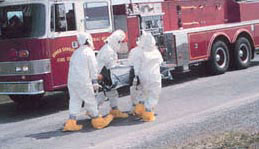Chemical Emergency
A chemical emergency occurs when a hazardous chemical has been released and the release has the potential for harming people's health. Chemical releases can be unintentional, as in the case of an industrial accident, or intentional, as in the case of a terrorist attack. Caution also must be taken with household chemicals. The Maryland Department of the Environment, in conjunction with local first responders, it the primary agency for handling chemical emergencies in Maryland.
Hazardous Materials
Chemical manufacturers are one source of hazardous materials, but there are many others, including service stations, hospitals, and hazardous materials waste 
sites. Hazards can occur during production, storage, transportation, use, or disposal. You and your community are at risk if a hazardous material is used unsafely or released in harmful amounts into the environment where you live, work, or play. The Maryland Department of the Environment, in conjunction with local first responders, it the primary agency for handling hazardous materials incidents in Maryland.
Shelter In Place
- Remain calm.
- Go inside if you are outdoors.
- Do not call 911 unless you are reporting an immediate life-threatening situation.
- Children in schools or day care centers will take shelter where they are located and will stay indoors.
- Close all windows and doors. Tape cracks for extra protection.
- Close all vents on cooling, heating or ventilating systems. Cover cracks under doors with damp towels.
- If you have a fireplace, put out the fire and close the damper.
- Tape cracks and other openings such as electrical outlets and cable tv outlets for extra protection.
- Move to an interior room or hallway with no windows or doors to the outside.
- Keep pets indoors.
- Listen carefully to a portable radio for instructions from emergency officials.
- If you are in a car, close windows and vents.
Evacuation
Evacuating means leaving the area that is affected by the potential hazard. Sometimes a chemical accident, such as an overturned tanker truck, will force people from their homes for health and safety reasons. If you are asked to evacuate, here's what to do:
- Remain calm.
- Listen carefully to the instructions you are given and be sure you are in an area that is being evacuated.
- If told to evacuate, do so!
- Do not use the phone except to dial 911 in a life-threatening situation.
- Take your "Disaster Supplies Kit" with you.
- DO NOT go to your children's school. If they are in the evacuation area they will be taken care of. They will probably be gone by the time you get there.
- Close and lock windows and doors.>
- Turn off all fans, heating and cooling units.
- Bring pets indoors and leave food and water for your them. Remember, pets ARE NOT allowed in emergency shelters!
- Keep vehicle windows and vents closed while evacuating.
- Follow instructions of emergency personnel along evacuation routes.
- Stay tuned to radio and television for further instructions from emergency officials.